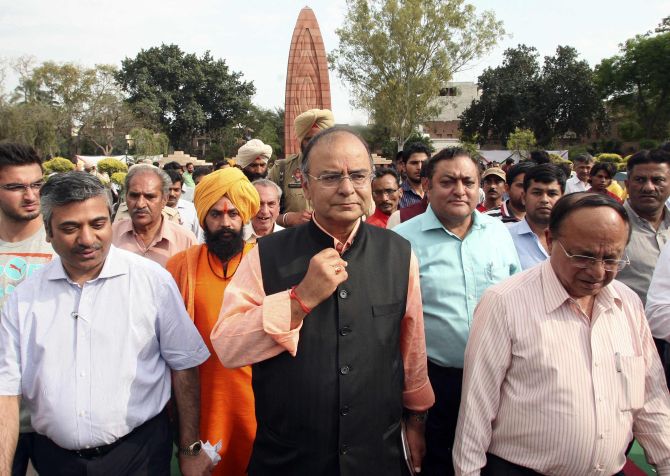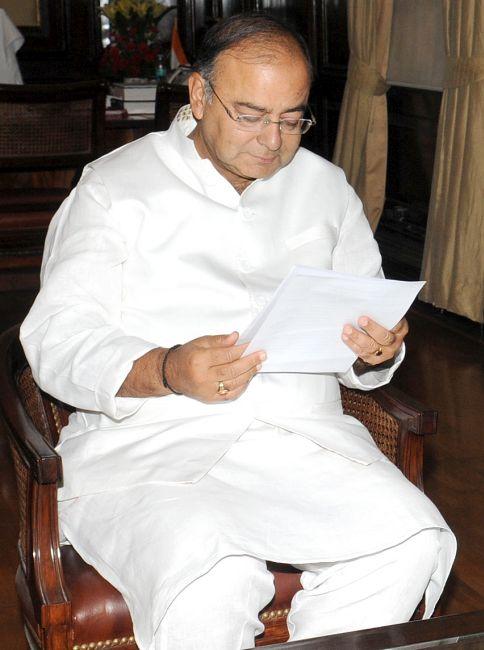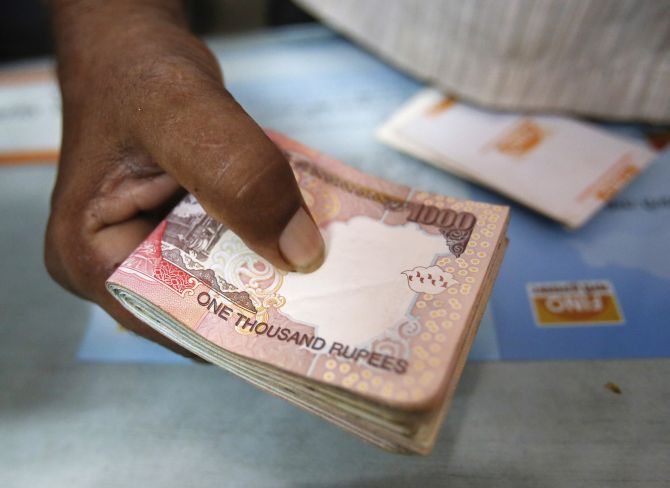Photographs: Rupak De Chowdhuri/Reuters Business Standard
Jaitley has constructed his Budget on the assumption that the promise of achche din (good days) are already here, that tax buoyancy will result and that record disinvestment will be possible in a buoyant stock market.
The finance minister has announced increased expenditure of about Rs 31,000 crore (Rs 310 billion) more than mentioned in the interim Budget of February.
On the revenue side, he has given away a net amount of about Rs 9,000 crore (Rs 90 billion) in tax giveaways (Central account, plus more on the states’ account).
That’s a cumulative figure of Rs 40,000 crore (Rs 400 billion) that has to be accounted for, yet the fiscal deficit is only Rs 2,000 crore (Rs 20 billion) more than it was in February.
How has Mr Jaitley managed this?
By raising the disinvestment target to an all-time high, by assuming much higher dividend payouts by the Reserve Bank, government-owned banks and other financial institutions, and other such non-tax receipts.
Please . . .
Budget: An assumption of 'Achche Din'?
Photographs: Reuters
Some of this may be doable; but, with less than nine months left in the year, the disinvestment target in particular will be a challenge -- even if the buoyancy on the stock market is a helpful development.
There is optimism in display in the tax revenue assumptions as well.
Overall, tax collection is expected to go up by 17.7 per cent over last year.
The last time there was such an increase in tax revenue was four years ago, but that was a bounce-back after flat revenue in the previous, crisis year of 2009-10, and aided in particular by a rollback of some tax cuts.
No such boosters exist today, and the only reason for assuming such buoyancy is the recovery of economic growth by about a percentage point of gross domestic product or GDP (as postulated in the Economic Survey).
Please . . .
Budget: An assumption of 'Achche Din'?
Image: Finance Minister Arun Jaitley.Photographs: Reuters
In itself, that growth assumption is optimistic when the monsoons are less than normal.
So whether the tax-GDP ratio can be raised as budgeted, from 10.2 per cent to 10.6 per cent, which would be its highest level in six years, is a valid question.
That 0.4 percentage point increase in the tax-GDP ratio translates into more than Rs 50,000 crore (Rs 500 billion).
If that tax bonanza does not materialise, the budget arithmetic comes unstuck.
In short, Mr Jaitley has constructed his Budget on the assumption that the promise of achche din (good days) are already here, that tax buoyancy will result and that record disinvestment will be possible in a buoyant stock market.
That said, Mr Jaitley’s is a Budget designed to win plaudits all round.
Please . . .
Budget: An assumption of 'Achche Din'?
Photographs: Reuters
He has offered goodies to all taxpayers but especially benefiting the ‘neo-middle class; to which he referred more than once in his Budget speech, to stock market intermediaries like fund managers, and to companies small, medium and large in the form of the expanded investment allowance.
There is logic at work in most of what has been announced.
In attacking the tax arbitrage that has been enjoyed by debt-mutual funds, for instance, Mr Jaitley has been rational but also, in the process, made investment in equities as well as bank deposits relatively more attractive.
However, there is more than logic at work, and the intention has manifestly been to spread a mood of cheer -- perhaps in the hope that this would encourage both consumption and investment.
Please . . .
Budget: An assumption of 'Achche Din'?
Photographs: Reuters
The strategy might work, but it bears noting that the raising of the tax exemption floor by 25 per cent more than neutralises the inflation rate last year.
This plus the increase in the limit for tax-free savings mean that one can have a tax-free salary of perhaps as much as Rs 30,000 per month if it is intelligently structured.
That would be very much a middle-class salary, and it is an open question whether anyone in the middle-class, living in a largely poor country, should be free of income-tax obligations.
Meanwhile, if you expected the Modi government to take tough decisions in its first two years, such a strategy is not in evidence -- for instance, the subsidy bill has grown, not been cut.
Please . . .
Budget: An assumption of 'Achche Din'?
Image: Finance Minister Arun JaitleyPhotographs: Courtesy, PIB
The policy announcements made in the Budget speech are to be welcomed.
Higher foreign investment in insurance companies and in the defence sector are entirely to be welcomed, though how the Bharatiya Janata Party after doing a flip on the first can stop the Congress from doing a reverse flip remains to be seen.
Meanwhile, domestic manufacture is greatly to be preferred to imports when it comes to defence hardware, so Mr Antony’s criticism on this issue should be rejected.
Also to be welcomed is the proposal to offer more shares of public sector banks to the public, though the stress on retail investors is a needless injection of stock market populism.
Mr Jaitley has been sensibly careful in his response to the issues of retrospective taxation, transfer pricing and ‘tax terrorism’.
Please . . .
Budget: An assumption of 'Achche Din'?
Photographs: Reuters
He has gone as far as he reasonably can on the first, through a statement of intent; introduced procedural safeguards for the second; and ruled out the third.
The finance minister needs to take the next step of making sure that revenue target-chasing by tax officials does not result in the needless harassment of taxpayers, especially towards the end of the financial year.
The Budget speech, of record length, had a long list of new institutions to be created all across the country -- new institutes for medical, technological and management education, new research institutes for everything from horticulture to Himalayan studies, and other such.
All Budget speeches have such lists, but as in past years many of the announcements this year have been backed with little by way of Budget provisions, even as the finance minister has not resisted the temptation to tinker with specific tax rates for everything from sports gloves to smart cards.
If the minister is serious about introducing an integrated Goods and Services Tax next July, it is time he focused on unifying rates rather than introducing new special rates.









article